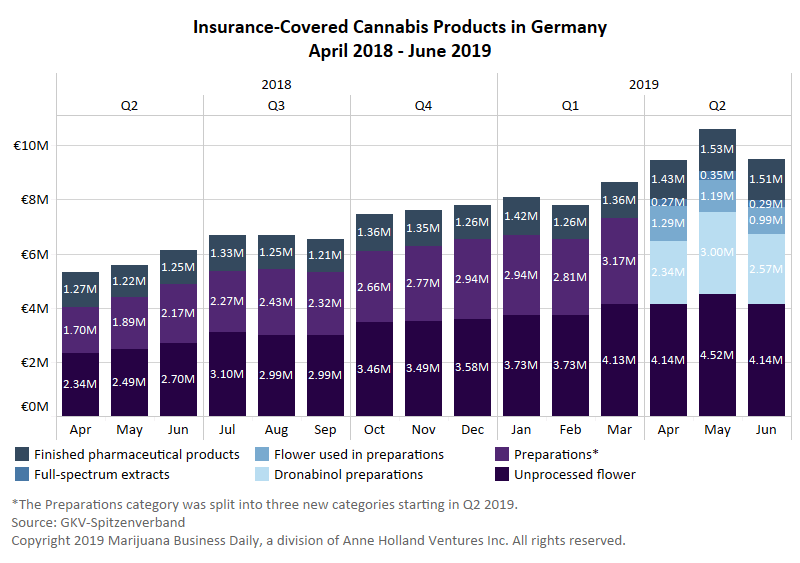French lawmakers appear ready to approve legislation to bankroll a two-year medical cannabis trial program for 3,000 patients, a move that would give overseas companies the opportunity to export product to what could become one of Europe’s largest markets.
Olivier Véran, deputy of the French National Assembly, submitted an amendment to the Social Security Financing Bill (Projet de loi de financement de la Sécurité sociale, or PLFSS) that is critical to secure funding for the proposed national medical cannabis experiment.
The bill is currently being discussed in the lower house.
If that happens, the bill would lead to the launch of the two-year trial program that was recommended last summer by a special committee of the French Agency for the Safety of Medicines and Health Products (ANSM).
Many of the details – including the amount of funding – must still be ironed out.
France is often seen as the most immediate hope of a meaningful medical cannabis market in the European Union, where only Germany currently has significant sales of the drug.
Far behind Germany are EU members Italy and the Netherlands. The United Kingdom has failed to provide real access almost one year after the change of its law.
The amendment is expected to be discussed in committee Tuesday and then debated in a public session of the National Assembly next week.
Véran, who is also a neurologist, justified the need for the amendment to local media RTL news agency, saying that “there are patients who need it.”
Benjamin-Alexandre Jeanroy, consultant for the French Professional Hemp Union (Syndicat Professionnel du Chanvre), which gathers the economic actors from the French hemp and medical cannabis sectors, told Marijuana Business Daily that the PLFSS is a “huge bill that’s tabled every year to finance social security issues.”
“It’s very important that funding for the medical cannabis experiment is now integrated into this process,” Jeanroy said. “It validates the intentions of the government. Once approved by the National Assembly, it’s set in stone.”
But the proposed amendment lacks important details such as the amount that will be designated to fund the experiment.
Jeanroy doesn’t expect the National Assembly to add many more specifics to the amendment.
The executive power – especially the ANSM and the French Health Ministry – will draft a more detailed decree of application once the National Assembly approves the bill in a “symbolic but important step,” he added.
What we know about the proposal
The amendment notes that 3,000 patients could benefit from the program, which would provide free medical cannabis products.
Though the number of patients appears insignificant for a country with a population of roughly 67 million, Jeanroy sees the 3,000 estimate as positive because “it’s larger than the 1,500-2,000 range that government officials were mentioning in previous conversations.”
Under the experimental program, only trained doctors will be able to prescribe medical cannabis, and the first prescription for each patient must be fulfilled in a hospital pharmacy.
Medical cannabis products won’t be prescribed for smoking, only for ingestion or vaporizing.
The amendment stipulates that the experimental program will last two years, a period in which the state may authorize the medical use of cannabis in the form of products meeting pharmaceutical standards, for certain medical conditions or clinical situations that are intractable with traditional normal medications.
The ANSM previously recommended that cannabis be considered only as a last resort and for just five medical conditions.
While the amendment doesn’t specify what it means by “pharmaceutical standards,” compliance with EU-Good Manufacturing Practice (GMP) is expected to be a requirement, limiting potential suppliers to only a handful of producers in the world.
The PLFSS, with the cannabis amendment, is expected to be approved before the end of year.
In the meantime, the ANSM likely will start:
- Organizing the training of doctors and pharmacists who will respectively prescribe or dispense cannabis.
- Creating the registry to monitor patients.
- Securing supply.
The agency is expected to create a special working group to execute those tasks “very soon,” Jeanroy said.
Once the 3,000 patients are selected, it’s unlikely more would be able to join the program.
Monitoring the progress of the 3,000 patients in the program will be a crucial factor in deciding at the end of the experiment whether a more generalized access – and health insurance coverage – should be approved.
According to the amendment, the experiment “will assess the relevance of the prescribing and dispensing system in real situations, the adherence of health professionals and patients and provide the first French risk-benefit data.”
Jeanroy notes that “this is a first step, which will condition the potential generalization of the policy.”
Current access
In its summary, the amendment notes that the use of medical cannabis and its derivatives was strictly prohibited in France until a June 2013 decree that allowed cannabis-based pharmaceutical products with French or European marketing authorization.
Currently, only two drugs – both manufactured by UK-based GW Pharmaceuticals – would qualify:
- Sativex, which has received marketing authorization in France but has not been sold there because of a disagreement on price.
- Epidiolex, the first plant-derived cannabis medicine approved by the European Commission, which has been available in France since December 2018 thanks to a temporary authorization.
The summary also notes:
- Many international scientific journals attest to the beneficial effects of medical cannabis.
- Because of the current lack of legal access, patients in France circumvent the law through trafficking, home-production or buying medical cannabis in foreign pharmacies – especially in the Netherlands – often with prescriptions that French doctors are entitled to write.
- Patients incur significant risks – both penal and health-related – because of the current limited access.





